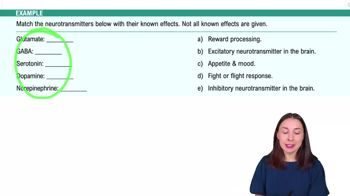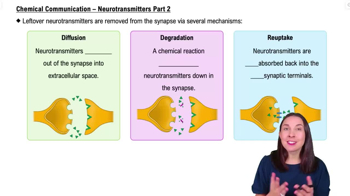Table of contents
- 1. Introduction to Psychology1h 43m
- 2. Psychology Research2h 20m
- 3. Biological Psychology2h 41m
- 4. Sensation and Perception28m
- 5. Consciousness and Sleep32m
- 6. Learning41m
- 7. Memory34m
- 8. Cognition37m
- 9. Emotion and Motivation35m
- 10. Developmental Psychology33m
- 11. Personality48m
- 12. Social Psychology41m
- 13. Stress and Health41m
- 14. Psychological Disorders44m
- 15. Treatment47m
3. Biological Psychology
Communication in the Nervous System
Struggling with Psychology?
Join thousands of students who trust us to help them ace their exams!Watch the first videoMultiple Choice
Which of the follow statements about action potentials are true?
I) A neuron’s resting potential is -55 mV.
II) An all-or-nothing response means once the threshold is reached, the action potential will fire.
III) The refractory period means there is a time where the neuron can’t fire.
A
I & II only.
B
I & III only.
C
II & III only.
D
I, II, & III.
 Verified step by step guidance
Verified step by step guidance1
Understand the concept of a neuron's resting potential: A typical neuron's resting potential is around -70 mV, not -55 mV. This is the electrical charge difference across the neuron's membrane when it is not actively sending a signal.
Examine the all-or-nothing response: This principle states that once the threshold potential is reached (usually around -55 mV), the neuron will fire an action potential. This is a true statement.
Consider the refractory period: This is the time after an action potential during which a neuron is unable to fire another action potential. This is also a true statement.
Evaluate statement I: Since the resting potential is not -55 mV, statement I is false.
Determine the correct combination: Based on the analysis, statements II and III are true, making the correct answer 'II & III only.'

 1:20m
1:20mWatch next
Master Electrochemical Communication with a bite sized video explanation from Hannah Gordils
Start learningRelated Videos
Related Practice
































